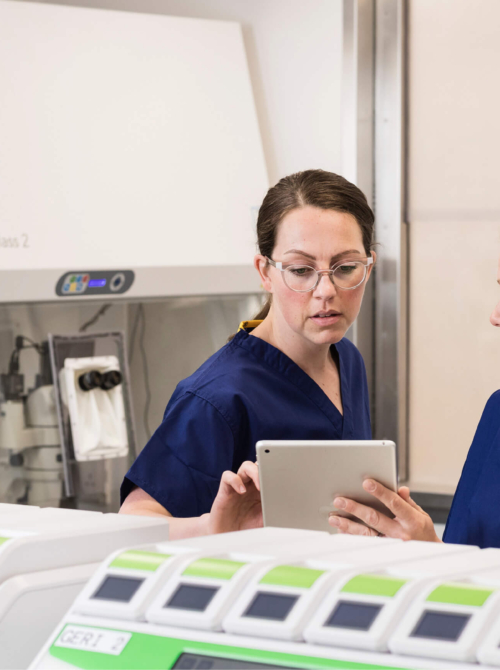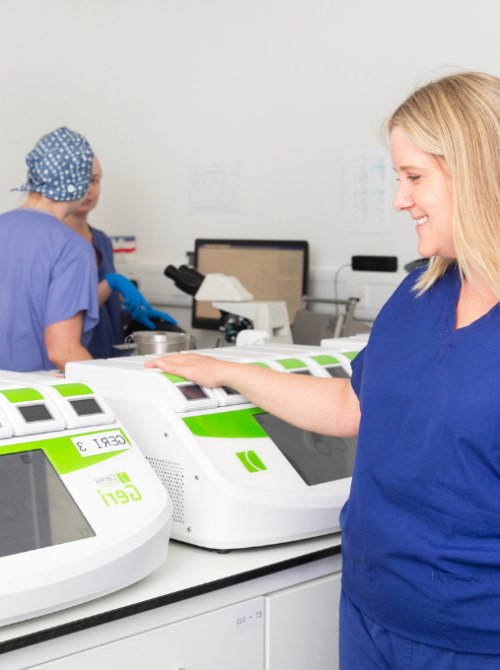When does an embryo become a foetus?
Many people wonder ‘when does an embryo become a baby?’ or ‘when does an embryo become a foetus?’ and ‘when does a foetus form?’ Through this article, Millie Kanani, Lab Manager at The Evewell Harley Street, will be differentiating an embryo from a foetus and looking into the first trimester of pregnancy.
When does an embryo become a foetus?
For many the pregnancy journey doesn’t begin when you find out you’re pregnant, it takes place when you decide you are ready to be a parent. Here at The Evewell, we understand the difficulty that can come with conceiving a baby. However, there are ways to increase your fertility which you can read all about here. If lifestyle alterations and a year of trying haven’t worked, we recommend investing in your fertility by booking a consultation with a fertility clinic. There are a plethora of options to help you conceive, as shown by the amazing fertility success rates we have at The Evewell.
What is an embryo?
Fertilisation occurs when a sperm cell enters a mature egg cell. The DNA from these two cells combine, forming a zygote. The zygote repeatedly divides into smaller embryonic cells.
Once the embryo contains 12 to 16 cells, it is called a morula. About four days after fertilisation, the morula moves towards the inside of the uterus and develops a fluid pocket called a blastocele, forming a pocket of fluid surrounded by cells. The embryo is now called a blastocyst.
About six days after fertilization, the blastocyst typically attaches to the uterine lining and over the next few days burrows through the endometrium so that it can take nutrients from its surroundings.
Successful pregnancies typically burrow or implant during the implantation window, which is the receptive phase of the endometrium. It occurs 5-6 days after ovulation and closes 3-4 days later.
What is the difference between an embryo and a foetus?
The difference between an embryo and a foetus is the stage of pregnancy. Pregnancy is divided into three trimesters each lasting between 12 and 13 weeks. The embryonic phase is defined as the time period between fertilisation and the 8th week of pregnancy. After this, the embryo is called a foetus due to all the vital formations being complete and the chances of miscarriage dramatically drop. In trimester one 80% of miscarriages occur, whereas in trimester two this drops to 2-3%; thus the majority of people decide to keep their pregnancy a secret until they are through the initial 3 months.
The First Trimester
When is a baby an embryo?
Month 1 (1-4 weeks) – From conception, the baby is called an embryo. For the first 4 weeks after conceiving the fertilised egg is growing and the amniotic sac, which is filled with liquid, forms around the embryo. This works as a protective shield for your baby throughout pregnancy.
During this period the placenta develops. The placenta is an organ that develops inside the uterus and transfers nutrients and oxygen from the mother to the child. By the end of your first month, the embryo will be smaller than a grain of rice, a quarter of an inch long.
Month 2 (5- 8 weeks) – By week number 5 the embryo would have started the development of vital organs and body parts; the neural tube begins to form which in time will become the brain and spinal cord. Alongside this buds appear- soon to become arms and legs. Also, the heart and lungs slowly develop and you may be able to hear a heartbeat on the ultrasound. Despite all of this amazing formation, the embryo is still only the size of a pea.
The second month sees the development of the wrists, fingers, eyelids, ankles and genitals. The brain, liver and kidneys begin to work inside the embryo which is the equivalent of a kidney bean. 80% of miscarriages happen within the first trimester so it is important you take extra care of yourself in these early stages. To learn more about the risk of miscarriage read our article here.
When does an embryo become a foetus?
8 weeks – Your embryo is officially a foetus! The 8th week marks the transition to a foetus, and is the answer to the question ‘when does a foetus form’. By this stage of your pregnancy, the structures have formed and will continue to develop. The neural tube is well-formed, the bones start to replace cartilage and you will be able to make out the shape of the eyes, nose and mouth.
Month 3 (9 – 12 weeks) – By the end of your first month and trimester, the foetus will be fully formed. From arms and legs to fingers and toes, the development now moves onto the fingernails and toenails. The foetus will be able to close its fists and the mouth and teeth are forming under the gums. Urinary systems are functioning and reproductive organs are continuing to develop although at this stage it is still hard to pinpoint the gender during an ultrasound
That is your first trimester in a nutshell! Hopefully, now you can answer the question ‘when does an embryo become a foetus’ and you know the developments a baby goes through during the important first 3 months of pregnancy.
How we can help
At The Evewell, we also offer advanced 3D scanning for early pregnancy and we understand how the concept of growing a baby can be daunting. The female body really is extraordinary!
If you need help or are having difficulty getting pregnant, The Evewell can arrange a consultation with one of our specialist fertility doctors who can answer any questions or concerns you may have. Get in touch by either emailing us at appointments@evewell.com or giving us a call on 020 3974 0950.
Please see the full list of Fertility services we offer here.


